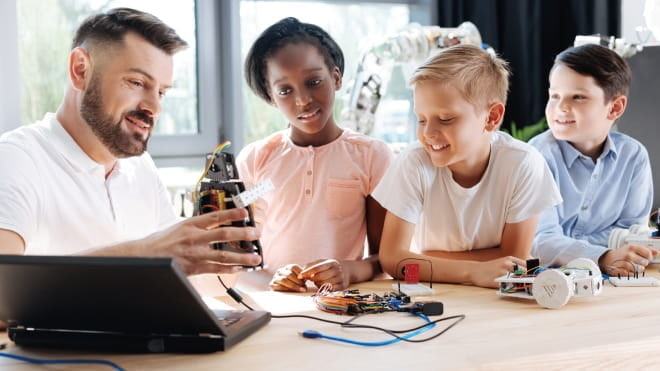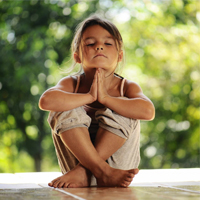Recent Posts
Supporting children through times of grief

As parents and caregivers of children, it can be challenging to see them struggle or feel hurt, particularly if you're uncertain how to best support them. Regardless of age, grief and loss touch everyone's lives and affects each differently.
As adults attending to your own loss, you can be overwhelmed with the emotional and sometimes physical pain that accompanies the grieving process. The healing journey can start with support from the presence, guidance and encouragement of family and friends.
Invisible grief
Children often are referred to as the forgotten or invisible grievers. You may not always see children’s grief displayed outwardly. Internally, children may feel and react to emotions that are difficult to express.
They might not have the words or understanding of what they feel to communicate or process what they're going through. You may think of children as being resilient. Still, it's only through understanding what they're experiencing and then providing presence, support and coping tools to foster healthy exploration of the emotion and learn from it to build resiliency.
Like adults, children have a wide range of reactions to grief and loss that can be affected by multiple variables. Children’s behavior often can be regressive when feelings are not verbalized. It's important to realize that while a child may not be talking about a loss, they're most certainly thinking about it.
Talking to children about grief
Normalize and validate grief using these strategies:
- Talk about grief to begin awareness.
- Share language on how to talk about grief.
- Understand how grief and loss may impact children.
One example of saying this is: "I feel sad since your grandmother passed away. I miss her, and when I think about her, that makes me cry. My tears allow me to let some of my sadness release a bit. After I cry, I still miss her and am sad, but I feel better for a while. Being sad and missing the person is to be expected when they pass on. And releasing the feelings instead of trying to push them away is helpful."
Another example of talking to a sibling is: "I miss your brother so much that I am feeling so many feelings at once. I am sad. I am angry. I am lonesome for him. When I feel that way, it helps me to talk to my friend. She listens and sits with me. When I'm done talking, she may suggest we take a walk or play cards. I still miss your brother and wish he were here with us, but I feel a little better at that moment. Grief hits us differently, but being with others, crying when we need to, and trying different things to feel better all help."
Recurring grief patterns
Grief also is cyclical for children. They may grieve the loss multiple times through different developmental stages in life as understanding deepens. Like adults, children vary in expression and experience of grief. It's important to remember that there is no right or wrong way to grieve.
Parents and caregivers can't protect a child from the pain of loss. Creating a warm, safe and accepting environment for children supports the grief experience and establishes the foundation for healing.
It's important to take your cues from children. Depending on the developmental stage, they may not be able to stay with their emotion for extended amounts of time. You may see children in tears one moment and then playing the next moment. You can learn from children by taking the emotion as it comes and releasing it to move on to another action.
Modeling healthy ways of grieving
Just like other firsts in our lives, we learn by watching and imitating others.
Help make meaning about the loss and normalize talking about grieving the loved one. An important part of grief is finding ways to continue a relationship with the deceased person even though they no longer are present.
What can that look like daily, on holidays or the anniversary of the death?
Talk with your children about how they're feeling or thinking. Offer answers to questions, but don't overload with more information than what the child is asking or what is developmentally appropriate. It's OK to be honest and direct.
Ways to support a grieving child include:
- Having a consistent and regular routine. Eating well, staying hydrated, doing physical activity and getting good sleep are vital.
- Being patient and gentle, not to add additional stress.
- Allowing for moments of connection and assisting in the expression of grief.
- Providing opportunities to remember and talk about the person who has died.
- Listening without judgment or adverse reaction.
- Offering reassurance, teach your children to breathe through their feelings.
- Incorporate mindfulness to notice their feelings right now and let them know it's ok to name the emotions and not fight them.
- Encourage children to notice how the feelings will come and go, sometimes intense and sometimes mild.
- Creating outlets for healing through time outdoors, arts and crafts, writing or journaling, music, watching a movie, or spending time with friends.
Children may grieve differently than a parent or sibling, and it's important to recognize and accept that. Many good books for children explain the grieving process to help guide conversations and provide language to prompt and answer children's questions.
Lastly, it’s healthy and normal for children to need connection with peers to play, laugh and have time aside from talking about the loss. This is part of the healing and grieving process.
If you feel grief has become complicated for your children, resources are available to help, including grief support groups, your health care team or faith leaders, employee assistance programs through your employer, and professional counseling services.
Grieving isn't about pushing the pain away or getting through it fast and moving on. Grief is a natural and necessary part of healing.
When you honor grief, you heal and grow through grief. You can't take away your children's pain, but it can be an opportunity to teach them to grieve in a good way and watch them learn to heal.
Sarah Cormell is a licensed clinical social worker in Family Medicine in Menomonie, Wisconsin.




